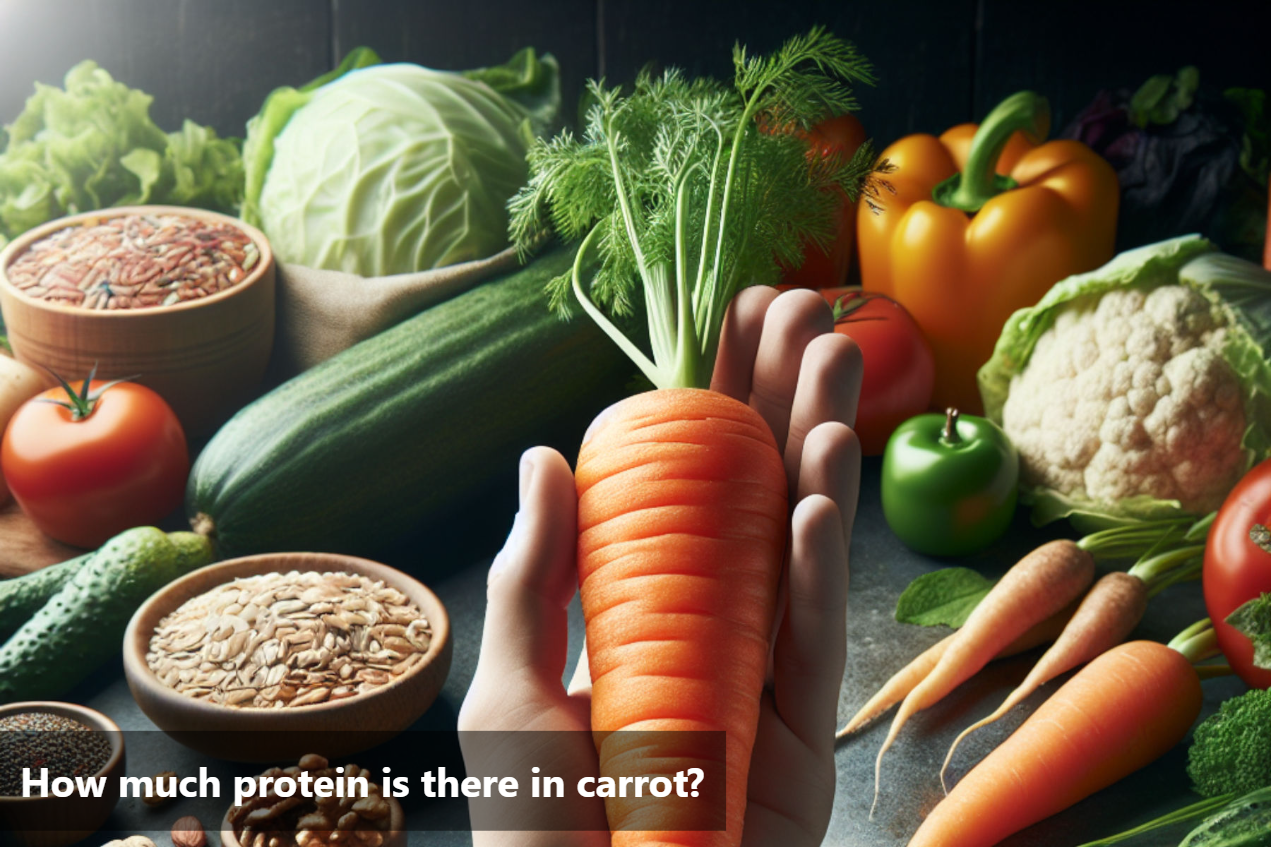
How much protein is there in carrot?
When it comes to protein in carrots, this crunchy root vegetable might surprise you. While not as protein-rich as animal sources, carrots still offer a respectable amount of this macronutrient. In just 100 grams of carrots, you can find a noteworthy protein content, making it a valuable addition to a balanced diet.
As we explore the significance of protein in our daily nutrition, understanding the protein content in carrots becomes essential. Whether you're a fitness enthusiast seeking alternative protein sources or simply looking to boost your overall protein intake, incorporating carrots into your meals can be a flavorful and nutritious choice.

Nutritional Value of Carrots
Two small-to-medium raw carrots (100 grams) provides:
Calories |
41 |
Water |
88% |
Protein |
0.9 grams |
Carbs |
9.6 grams |
Sugar |
4.7 grams |
Fiber |
2.8 grams |
Fat |
0.2 grams |
Health Benefits
Rich Source of Nutrients: Carrots are packed with essential nutrients like vitamins A, C, and K, as well as potassium and fiber.
Improves Vision: Carrots are famously known for promoting good vision due to their high vitamin A content, which is essential for maintaining eye health and night vision.
Antioxidant Properties: Carrots contain antioxidants like beta-carotene, which helps protect cells from damage caused by free radicals, reducing the risk of chronic diseases like heart disease and certain cancers.
Promotes Healthy Skin: The antioxidants in carrots contribute to healthy skin by protecting it from sun damage and promoting collagen production, which helps maintain skin elasticity and prevents premature aging.
Boosts Immunity: The abundance of vitamins and antioxidants in carrots supports a healthy immune system, helping the body fight off infections and illnesses.
Aids in Digestion: Carrots are a good source of dietary fiber, which aids in digestion by promoting regular bowel movements and preventing constipation.
May Lower Cholesterol: The soluble fiber in carrots may help lower cholesterol levels by binding to bile acids in the digestive system and promoting their excretion.
Regulates Blood Sugar: Carrots have a low glycemic index, meaning they cause a slow and steady increase in blood sugar levels, making them suitable for people with diabetes when consumed in moderation.
Supports Heart Health: The potassium in carrots helps regulate blood pressure and promote heart health by counteracting the effects of sodium and reducing the risk of stroke and heart disease.
Contributes to Weight Management: Carrots are low in calories and high in fiber, making them a filling snack option that can help control appetite and support weight loss or maintenance goals.
Ways to Incorporate Carrots into a Protein-Rich Diet
One simple way to incorporate carrots into your meals is by adding them to protein smoothies.
For a refreshing and nutritious drink, blend together carrots, Greek yogurt, and a hint of honey for sweetness. This not only boosts the protein content but also provides you with essential vitamins and fiber.
Another creative way to enjoy carrots in a protein-packed meal is by spiralizing them into “carrot noodles” as a low-carb alternative to pasta. Toss these carrot noodles with grilled chicken or tofu for a satisfying and nutrient-dense dish.
Additionally, you can roast carrots in the oven with a sprinkle of protein-rich nuts like almonds or walnuts for a crunchy and flavorful side dish.
Experiment with different seasonings such as cumin, paprika, or garlic powder to enhance the flavors.
Carrot and chickpea salad is another delicious option worth trying.
Combine diced carrots with chickpeas, cherry tomatoes, and a zesty vinaigrette for a protein-packed salad that is perfect for lunch or a light dinner.
By getting creative with your meal preparation, you can easily boost your protein intake while enjoying the numerous health benefits that carrots have to offer.

Unveiling the Protein Content in Carrot
The protein content in carrots may be surprising to many individuals seeking to increase their protein intake. While carrots are not typically known as a significant protein source, they still offer a valuable addition to a balanced diet. With approximately 0.9 grams of protein per 100 grams, carrots may not be as protein-rich as other foods, but their numerous other health benefits make them a crucial component of a nutritious eating plan.
By incorporating carrots into your daily meals, you can enjoy not only their unique taste and crunchy texture but also their contribution to your overall protein intake. Whether consumed raw as a crunchy snack, roasted to enhance their natural sweetness, or added to soups and stews for extra flavor and nutrients, carrots are a versatile vegetable that can easily be included in a protein-rich diet.
While carrots may not be the primary source of protein in a diet, their protein content should not be overlooked. Remember, a diverse and balanced diet that includes a variety of nutrient-rich foods, including carrots, is essential for achieving optimal protein intake and overall well-being.
This Blog post is an initiative by Lo! Foods, to provide accurate and Nutritionist / Doctor approved information related to Health. Lo! Foods is India's leading brand for Everyday Functional Foods. Foods designed for specific Health conditions or Needs. Lo! Foods also runs India's largest range of Low Carb Healthy Cloud Kitchens, under the brand names of Lo!, ProteinChef, ATH (All Things Healthy) and DiabeSmart.











Leave a comment
Your email address will not be published.